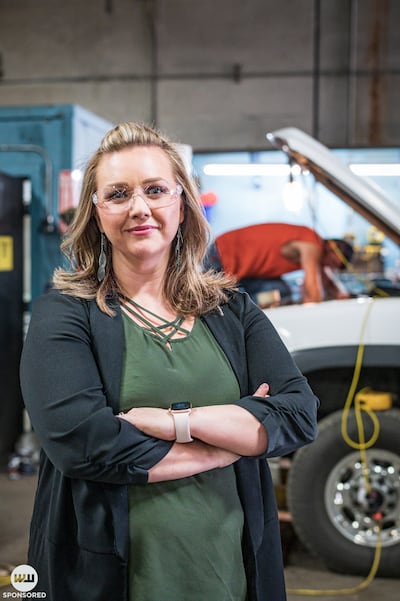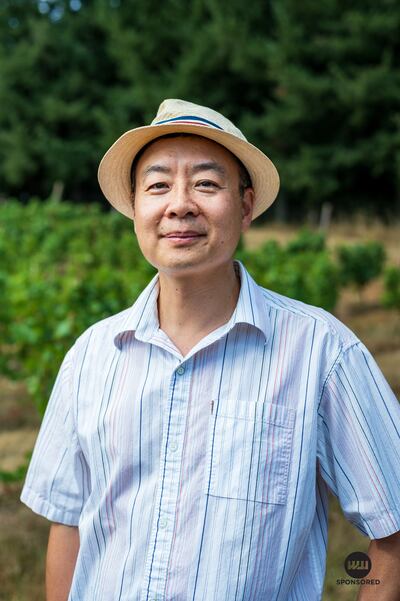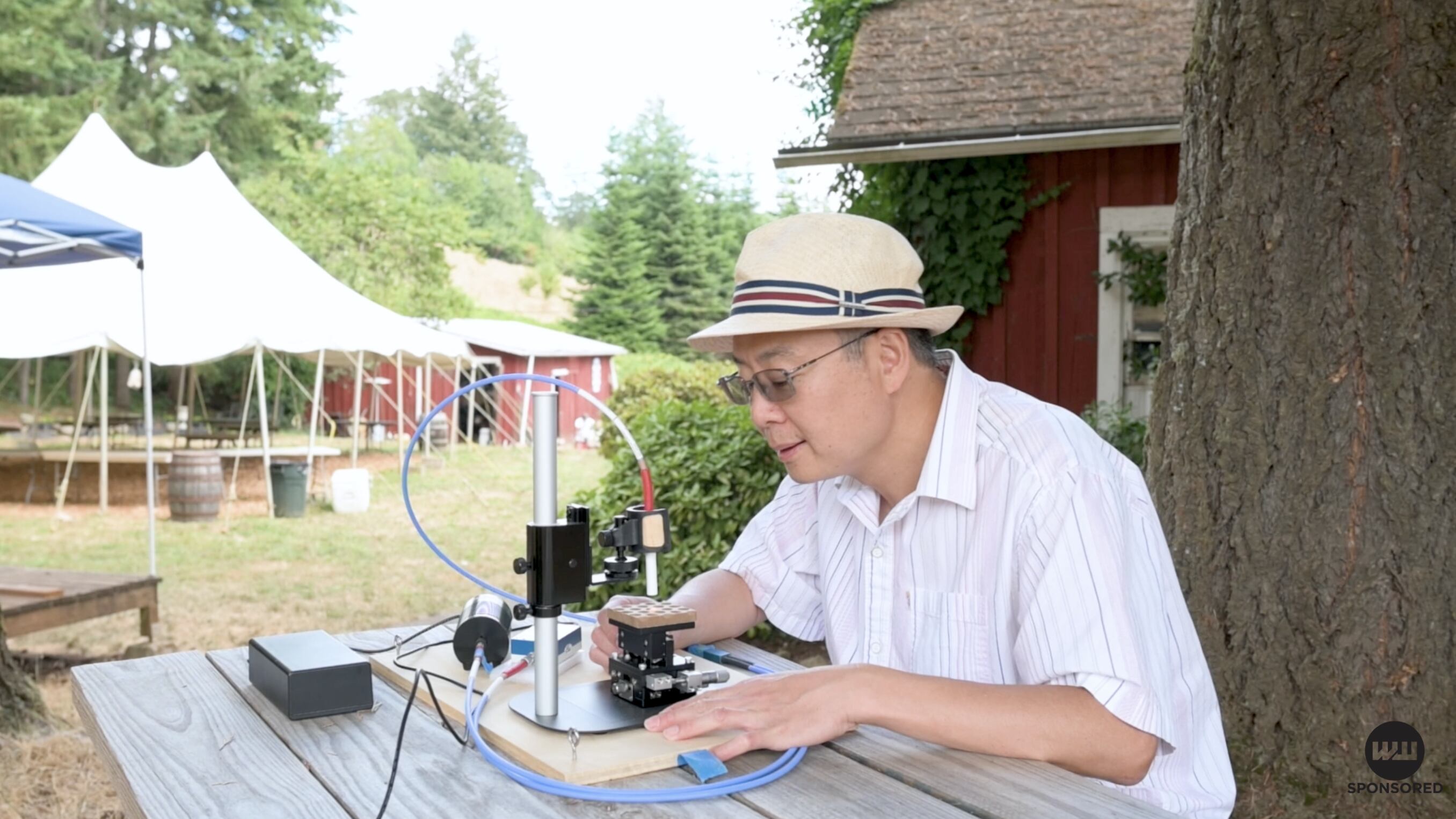This story is published in cooperation with Willamette Week and Oregon Executive MBA, Portland.
It’s been a transformative few years for most of us. But for Brandi Martin and Ye Feng, that transformation had nothing to do with the pandemic and its aftermath. Their transformation was spurred by internal unrest and a desire for something more
Brandi Martin
How it started: Leading Operations & Strategy at a Management Consulting Firm.

How it’s going: President and CEO of InstaFab, a company providing quality fabrication and installation in the PNW.
Brandi Martin always assumed she would go for a second-in-command position. She felt equipped to play a supporting role for a lead executive, but feared the pressure of shouldering the burden that CEOs have to carry. That changed after she began University of Oregon’s Executive MBA program.
Before entering the Portland-based program, Martin worked at the private investment firm F-L Management, where she oversaw the company’s assets as Director of Strategy and Operations. She enjoyed early career success–also serving as president for Portland’s chapter of the American Marketing Association–but a restlessness to grow and expand her skills motivated her to pursue a business degree.
Martin hoped that UO’s program would broaden her awareness of the skills and opportunities that could help accelerate her career. Perhaps she’d be able to leverage the cachet that comes with an MBA degree later on in her career. What she ended up gaining was a belief in her capacity for executive leadership.
“The program gave me tremendous confidence,” Martin said. “The first term, we had some courses that were pretty inspiring and helped you realize your potential and that you can do this.”
One of those courses, Global Studies, required students to pitch a new business venture in another country. The timeline initially seemed infeasible to Martin, but seeing her team foster a simple idea into a sophisticated plan over the course of two weeks opened her eyes to what she’s capable of accomplishing.
She also gained the decision-making skills and the poise it takes to lead a company. Breaking down case studies with professors and peers in courses helped her develop a more analytical approach to dealing with moments of crisis. As the new CEO for InstaFab, a steel fabrication and installation company, Martin’s practice with case studies was immediately put to the test in what she calls a “make-it-or-break-it moment” for the company within her first two weeks on the job.
“I was on stage, everyone was looking at me–very public forum–about how to respond. Had I not already been through some of this first-year training where I actually had a case study that was so relatable, I wouldn’t have known how to analyze this from many different angles and conduct myself appropriately,” Martin said. “Maybe I would’ve responded emotionally, maybe I would’ve taken a different approach that wouldn’t have been in the best interest of the company, because I didn’t slow down.”
Martin started her role as InstaFab’s CEO this May, when she was nearing the end of her first year at the executive MBA program. As the company’s CEO, she ensures there’s a unified culture, develops short and long-term plans, and fosters healthy lines of communication. She said that UO’s program instilled in her the importance of interacting with employees as whole persons–understanding their motivations, strengths, and flaws–a philosophy that has informed her approach as a lead executive.

Ye Feng
How it started: Leading Artificial Intelligence & Machine Learning for Lam Research.
How it’s going: Founder of Spectra Scientific LLC, a company that helps local vineyards quickly determine smoke exposure effects for grapes – a new problem brought on by climate change.
Ye Feng had a dream: using his scientific knowledge to benefit the environment. He knew that attaining his dream required stepping outside of his comfort zone to acquire new tools. That’s why he enrolled in UO’s Executive MBA program.
When he entered the Executive MBA program, Feng was developing optical sensing technology and machine learning for Lam Research, a semiconductor manufacturing company. An urge to do something about climate change made him restless. Hoping that a sharper business acumen could help him leverage his scientific skills for broader societal impact, Feng decided to pursue an MBA.
“I’m interested in the way that machine learning can solve real-world problems to benefit society,” Feng said. “An urgent problem we are facing is climate change and food insecurity. An agriculture technology company like Spectra Scientific – with the purpose of helping us mitigate climate change – might not be profitable in the near term, but its research and development tend to bring about new discoveries in the right direction.”
The chance to develop relationships with other members of his cohort, learn from experienced professors and business leaders, and gain entrepreneurial skills drew Feng’s attention to UO’s Executive MBA program in Portland.
His experience matched his lofty expectations. Through a ten-day study trip to Portugal and Spain and other global conferences he attended virtually, Feng interacted with international business leaders and learned how to network. Pitch competitions gave him practice presenting a business idea. Coursework enhanced his knowledge of the intersections between business and technology and the inner workings of technology startups. It was his final capstone project, however, that gave Feng the chance to enact his dream of mitigating the effects of climate change.
Feng had read about a problem climate change created for winemakers: smoke from a rising volume of wildfires can penetrate grapes, contaminating the taste of the wine those grapes produce. Winemakers lack fast, accurate, and low-cost ways to detect grapes’ exposure to smoke–a problem known as “smoke taint”–before fermenting them into wine.
Feng took the capstone project as an opportunity to merge his scientific skill set with his passion for environmental change by developing a solution for the smoke taint problem: an optical sensor that can detect the chemical change of grapes due to smoke exposure within minutes.
The networking skills Feng gained from the Executive MBA program played a crucial role in the rapid development of his project. In conversations with the wine industry’s leading winemakers and grape growers, he applied what he learned about conducting “customer interviews”: he delivered inspirational pitches, honed his understanding of the prospective customer’s problem, and requested referrals to other leaders in the industry. Eventually, he and his university collaborators were awarded a research grant by the American Vineyard Foundation and Oregon Wine Board.
Having secured financial backing, Feng’s capstone project transformed into his first company, Spectra Scientific, a startup offering innovative optical technology based on machine learning to enable fast and affordable detection of smoke taint for the wine industry. The research at Spectra Scientific is still in the early phase, with data being analyzed to evaluate the sensor’s efficacy and make necessary adjustments.
Feng said he hopes to make the sensor commercially available by 2024. While there’s always a chance that the wine industry may not adopt the Spectra Scientific sensor, Feng still sees opportunities for similar food tech tools in many other markets. As he develops his business, Feng said he can take pride in chasing his dreams, catalyzed by the opportunities he received at UO’s executive MBA program.
“Starting up a company went from this nebulous dream into something that is very concrete,” Feng said. “I have my plan, and I’m executing my plan.”
